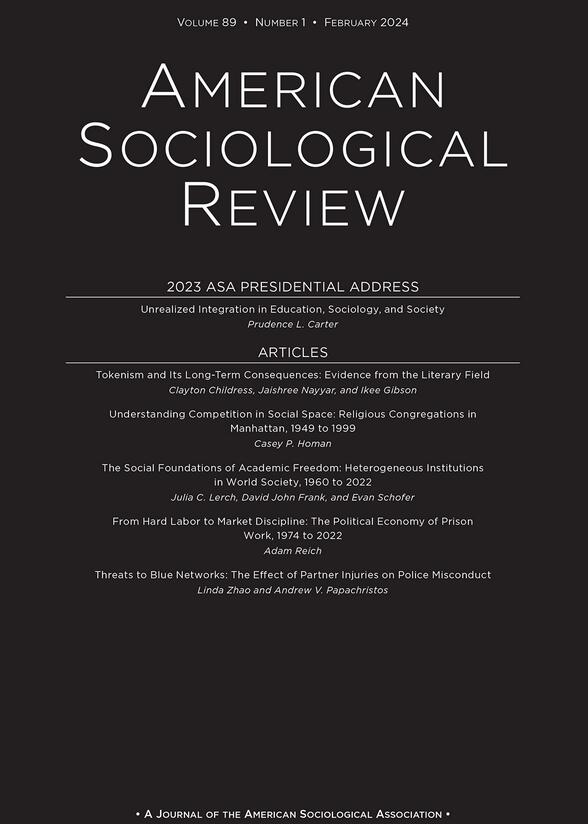The Right to Work and American Inequality
IF 6.2
1区 社会学
Q1 SOCIOLOGY
引用次数: 1
Abstract
Labor historians describe Right to Work (RTW) as among the most consequential pushbacks against the early twentieth-century ascent of labor unions. Yet research on the economic consequences of RTW remains mixed, with nearly all research centered empirically and theoretically on the time surrounding RTW passage. In the current study, I use 41 waves of longitudinal data from the Panel Study of Income Dynamics between 1968 and 2019 to empirically and theoretically extend the mechanisms that link RTW and economic outcomes. First, following the vast majority of research on RTW, I show the demobilizing effects for labor following RTW passage: mean wages decline, wage inequality increases, and the union premium is halved in the middle and lower portion of the wage distribution. Second, I move theoretical focus beyond the time surrounding law enactment, arguing for a second-order effect whereby RTW institutionalizes a logic of polarized economic distributions and low labor power. To test this mechanism, I develop a novel strategy of comparison across respondents who are differentially mobile across state boundaries. I find individuals who cross RTW contexts experience a unique decline in mean wages and increase in wage variance, but this distinct trend can be explained by state-level institutional variation across RTW and non-RTW states. Thus, RTW is not only consequential in the periods around its passage, but also in establishing a long-standing, high-inequality regime. Results reveal multiple mechanisms by which RTW contributes to the long-run processes of union decline and broadly shared inequality growth.工作权和美国的不平等
劳工历史学家将工作权(RTW)描述为对20世纪初工会崛起的最重要的抵制之一。然而,关于RTW经济后果的研究仍然参差不齐,几乎所有的研究都集中在经验和理论上围绕RTW通行的时间。在目前的研究中,我使用了来自1968年至2019年收入动态面板研究的41波纵向数据,从实证和理论上扩展了RTW与经济结果之间的联系机制。首先,根据绝大多数关于复员的研究,我展示了复员后劳动力的复员效应:平均工资下降,工资不平等加剧,工资分配中下部的工会溢价减半。其次,我将理论重点转移到法律制定的时间之外,论证了二阶效应,即RTW将两极分化的经济分配和低劳动力的逻辑制度化。为了测试这一机制,我开发了一种新的策略,对跨州流动程度不同的受访者进行比较。我发现跨越RTW背景的个人经历了平均工资的独特下降和工资差异的增加,但这种明显的趋势可以通过RTW和非RTW州之间的州一级制度差异来解释。因此,RTW不仅在其通过前后的时期具有重要意义,而且在建立一个长期的、高度不平等的制度方面也具有重要意义。研究结果揭示了RTW促进工会衰落和广泛共享的不平等增长的长期过程的多种机制。
本文章由计算机程序翻译,如有差异,请以英文原文为准。
求助全文
约1分钟内获得全文
求助全文
来源期刊

American Sociological Review
SOCIOLOGY-
CiteScore
13.30
自引率
3.30%
发文量
35
期刊介绍:
The American Sociological Association (ASA) is a non-profit membership association established in 1905. Its mission is to advance sociology as a scientific discipline and profession that serves the public good. ASA is comprised of approximately 12,000 members including faculty members, researchers, practitioners, and students in the field of sociology. Roughly 20% of the members work in government, business, or non-profit organizations.
One of ASA's primary endeavors is the publication and dissemination of important sociological research. To this end, they founded the American Sociological Review (ASR) in 1936. ASR is the flagship journal of the association and publishes original works that are of general interest and contribute to the advancement of sociology. The journal seeks to publish new theoretical developments, research results that enhance our understanding of fundamental social processes, and significant methodological innovations. ASR welcomes submissions from all areas of sociology, placing an emphasis on exceptional quality.
Aside from ASR, ASA also publishes 14 professional journals and magazines. Additionally, they organize an annual meeting that attracts over 6,000 participants. ASA's membership consists of scholars, professionals, and students dedicated to the study and application of sociology in various domains of society.
 求助内容:
求助内容: 应助结果提醒方式:
应助结果提醒方式:


